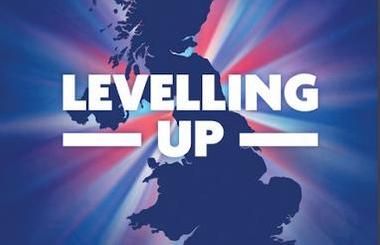Plans about the Shared Prosperity Fund, support for young people and spending dormant assets were included in the government’s levelling up white paper yesterday.
At over 300-pages it’s a long read. But fortunately, or unfortunately, not all of it is relevant to charities and social enterprises, so we’ve summarised the key points.
Shared Prosperity Fund
The UK Shared Prosperity Fund, worth £2.6bn over two years, will “be used to restore local pride” the paper says.
Initially the fund was expected to be £1.5bn per year. And it will be 2024-25 before it invests in people and skills.
“We will slash away the bureaucracy of the old EU regional funds. Instead, local leaders will be empowered to direct funding towards their own, locally identified priorities, whether that be promoting new outdoor markets, reducing litter, graffiti and anti-social behaviour, reviving high streets, supporting local businesses or introducing skills provision to match local labour market need and support those furthest from the labour market.”
As part of the fund, the Multiply numeracy programme will support people to gain or improve their numeracy skills.
Guidance for local authorities and others about this fund was also published yesterday.
Dormant assets
The amount of money available to the sector from dormant assets is set to increase as legislation expanding the number of assets it covers completes its passage through parliament.
Yesterday’s white paper reiterates a commitment to consult on whether to use some of this additional money for a community wealth funds, an idea the sector has championed.
“We will consider a Community Wealth Fund, financial inclusion and other social investment as part of our consultation on £880m in Dormant Assets funding,” the paper says.
The Youth Futures Foundation will get £20m to “help break down barriers and improve accessibility into employment for young people from disadvantaged backgrounds”.
Access – The Foundation for Social Investment – will get £20m to fund over 1,000 charities and social enterprises.
National Youth Guarantee
By 2025 the government wants all young people to have access to regular out of school activities and volunteering.
The paper says that 300 new or refurbished youth facilities will mean there are 45,000 extra youth activities each year.
“We will ensure the Duke of Edinburgh Award is offered to every state secondary school in England,” the paper says. “We will give more students the transformative opportunity to join the cadets, providing more support to the state school sector to increase Combined Cadet Force participation.
“This will include linking funding of cadet units in private schools with a requirement to ensure support for the expansion of cadet forces in state schools and open access to nearby state school students.”
A “reformed” National Citizen Service will be funded for three years.
Volunteering and understanding data
As part of levelling up, the government aims to increase volunteering.
“During the pandemic, heroic contributions were made by over 12.4m volunteers from right across the UK, including 4.6m people who volunteered for the first time,” it says.
Therefore, it will “build on the Volunteering Futures Fund”.
The government will also launch a strategy for community spaces and relationships, which will cover the following:
- making it easier for community groups to come together.
- building evidence of what works in communities.
- listening to communities “engaging with communities, local government and civil society to identify priorities, the assets that matter to local places, and the policies and actions needed to strengthen community infrastructure”.
- reaching out to disconnected communities.
To gain a “better understanding of the facts and figures behind community activity” the government says it will work with partners and the Office for National Statistics to develop a civil society satellite account.
This will mean “estimates more fully reflect the scope of the sector and fill a longstanding gap in official statistics”.
Community Covenant approaches
The government says this will be “new agreements between councils, public bodies and communities themselves to empower communities to shape the regeneration of their areas and improve public services”.
It adds: “A Covenant approach would see local authorities and communities work together to take a holistic look at the health of local civic and community life, set out a driving ambition for their area, and share power and resources to achieve this.”
The next step is to test this with local government and civil society partners, and further details will be set out this year.
Local assets, social enterprises and procurement
The paper says: “The UK government will consider how the existing Community Asset Transfer and Asset of Community Value Schemes can be enhanced, and consult on options to go further to support community ownership.”
Elsewhere, it will look at how to better support social enterprises in disadvantaged areas.
Thirdly, the government said it would continue to look at improving transparency in public procurement.
In practical terms, companies bidding for contracts for Birmingham 2022 “need to demonstrate a social value component”. For every contract, a minimum of 10% of the evaluation weighting is dedicated to social value – a first for any Commonwealth Games.
Other points
Office for Place
The paper says: “an Office for Place which will pioneer design and beauty, promoting better architectural aesthetics to ensure they enhance existing settlements, gladden the eye and lift the heart”.
Lottery funders
The paper says the government will “explore further collaboration between lottery funders for arts, heritage, sport and community projects within the UK to ensure that £1.7bn in National Lottery funding every year reaches the people and places that need it most”.
Levelling Up Cabinet Committee
The government has set up a new Levelling Up Cabinet Committee to embed levelling up across central government policy design and delivery. This is chaired by the secretary of state for levelling up, housing and communities.
Levelling up directors
As part of the government’s new approach to places, it will create the role of levelling up director, who will be “a key bridge between local actors and central government”.
Levelling Up Advisory Council
A new Levelling Up Advisory Council will “bring a diverse, independent and expert group of voices into the policymaking process”, the government says.
It comprises of the following members:
- Katherine Bennett (CEO, High Value Manufacturing Catapult and chair, Western Gateway)
- Sir Tim Besley (professor of Economics and Political Science, London School of Economics)
- Sir Paul Collier (professor of Economics and Public Policy at the Blavatnik School of Government, University of Oxford)
- Cathy Gormley-Heenan (former deputy vice-chancellor (research and impact), Ulster University)
- Sally Mapstone (principal, University of St Andrews)
- Laxman Narasimhan (CEO, Reckitt Benckiser)
- Sacha Romanovitch (CEO, Fair4all Finance)
- Hayaatun Sillem (CEO, Royal Academy of Engineering)
- David Skelton (director, Renewal)
- Sir Nigel Wilson (chief executive, L&G)
- Baroness Wolf (Professor, King’s College London).
Parks funding
Alongside the existing £9m UK-wide Levelling Up Parks Fund which provides direct grants to deliver over 100 green spaces in the communities with the lowest access, a new £30m parks fund will deliver up to £1m to at least 30 local parks in England for refurbishment with an emphasis on facilities for young families.
Culture, heritage and sport
The white paper sets out a commitment to funding cultural initiatives, particularly outside of London. It also focuses on funding to improve community football pitches.
Related articles










